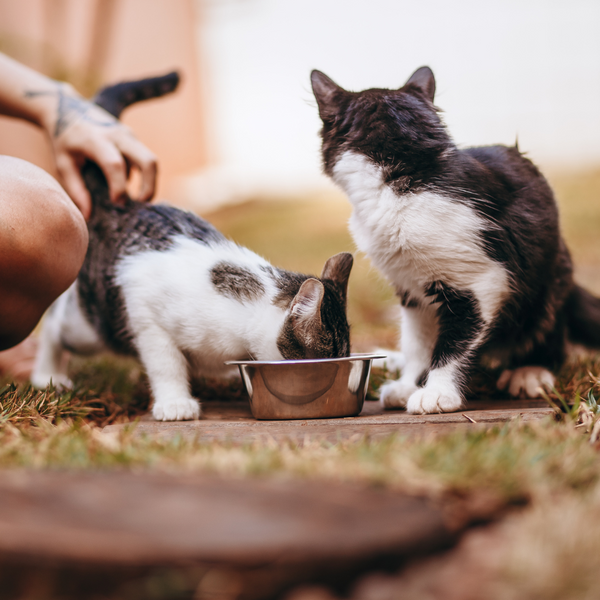
Vitamin Deficiencies in Your Pet - What To Look Out For
(Dr. Iulia Mihai, DVM) Pets need essential nutrients for their health and well-being which include vitamins, minerals, and antioxidants. All these essential nutrients help to maintain a strong skeleton, a strong immune system, and a shiny and healthy coat.
Most frequently, vitamin deficiencies occur when your pet does not consume a balanced, diversified diet or consumes food of inferior quality - all of these can cause vitamin-mineral deficiencies. However, there are multiple causes of vitamin deficiencies in your pet and we will discuss them in this article.
If your pet has a vitamin deficiency, you could notice a variety of problems. They may shed more, have a matted coat, have a weakened immune system, be prone to infections (especially ear and/or skin infections), diarrhea, constipation, growth problems, and vision problems… The list goes on.
What Are the Main Vitamins That Pets Need to Be Healthy?
The main vitamins that pets need to develop and be healthy are:
- Vitamin A (retinol) - is beneficial for vision, it strengthens the immune system, helps with cell regeneration and the optimal functioning of internal organs, and has an antioxidant effect by protecting cells against the effects of free radicals (cells from deteriorating).
- Vitamin C (ascorbic acid) - has an antioxidant role, helps form blood vessels, improves the absorption of iron in the body, and has a role in the healing process.
- Vitamin D (calciferol) - favors the intestinal absorption of calcium and helps maintain adequate blood levels of calcium and phosphorus, which are necessary for the mineralization of bones and teeth, and has a role in the immune system.
- Vitamin E (tocopherol) - antioxidant role in protecting cells from damage and supporting the immune system.
- Vitamin K (phytomenadione) – has a role in blood coagulation.
- B complex vitamins, including thiamin (B1), riboflavin (B2), niacin (B3), pantothenic acid (B5), pyridoxine (B6), biotin (B7), folic acid (B9), and cobalamin (B12).
- Vitamin B1 - has a role in the regulation of energy and carbohydrate metabolism.
- Vitamins B2, B3, and B12 – facilitate enzyme function.
- Vitamin B5 - has a role in energy metabolism.
- Vitamin B6 – a vital vitamin with a role in the formation of red cells, the functioning of the nervous system, hormonal regulation, immune response, etc.
- Vitamin B9 – has a role in amino acid metabolism.
How Do You Know if a Vet Visit Is Needed?
Because vitamins play a vital role in the optimal functioning of our pets' bodies and support numerous physiological processes, it is important to know what you should look for when your dog or cat suffers from a vitamin deficiency.
Usually, vitamin deficiencies in pets will have visible effects after a few months. Here's what you need to pay attention to or what you might notice if your dog or cat has a vitamin deficiency:
- Fatigue
- Dry skin
- Matted fur
- Excessive shedding
- Delayed wound healing
- Bone fractures (which occur easily)
- Easy bleeding
- Wounds that don't seem to stop bleeding
- Predisposition to infections (especially ear and skin infections)
- Vision problems
- Diarrhea or constipation
Fatigue and Weakness
If your pet seems tired or sleepy all the time, it is possible that they have a vitamin D, B, or C deficiency.
Matted Fur and Heavy Shedding
Usually, vitamins A, B, C, and D can lead to matted fur and excessive shedding.
Easy Bleeding and Difficult, Delayed Healing of the Wounds
Many essential vitamins contribute to the healing process. Some help to create collagen, others help to rebuild different types of cells or tissues, and others contribute to cellular health through antioxidant activity.
Easy bleeding can occur due to blood coagulation problems, defective healing of traumas/wounds, or low collagen synthesis. The vitamins that can lead to such problems are A, B, C, E, and K.
Predisposition to Infections
Vitamins A, C, and D play a role in the immune system. When there is a deficit in these vitamins, the immune system will be affected, making the body more prone to infections and infectious diseases. Particular attention should be paid to vitamin A because its deficiency can also lead to diarrhea, chronic ear infections, or respiratory diseases.
Bone Fractures
Vitamins A, B6, B9, B12, C, D, and K keep your pet's bones strong and healthy. When there is a deficit of one of these vitamins, bone density can be reduced which can lead to fractures.
Causes of Vitamin Deficiencies
The most common cause of vitamin deficiencies in pets is an inadequate diet (lack of diversity, low-quality food, or an unbalanced diet). Balanced diets and food diversity can provide your dog or cat with all the nutrients they need to lead a healthy life.
Depending on the breed and age of your pet, the deficiencies may differ. For example, in young pets, a lack of vitamin D can lead to rickets and/or bone fractures. In elderly pets, the lack of vitamins in their diet affects the metabolic processes and can lead to a variety of pathologies.
Other causes of vitamin deficiency in pets may include:
- A condition of the digestive tract and the presence of disease (nutrient absorption problems): Certain diseases can affect the intestinal absorption. For vitamins to be absorbed properly in the body (even if they are present in your pet's diet), the gastrointestinal tract must function correctly.
- Rapid growth: In growing puppies, deficiencies are likely to occur during periods of rapid growth. This often happens in large and giant breeds.
- Pregnancy and external factors: Stress, pregnancy, long-term conditions and the rehabilitation period affect the vitamin metabolism in pets' bodies.
- Intestinal worms: Parasitic diseases reduce immunity, worsen the condition of the gastrointestinal tract, and absorb the vitamins and essential nutrients that enter the body. As a result, your pet's body no longer receives proper nutrition and a vitamin deficiency may occur.
How Are Vitamin Deficiencies Diagnosed in Pets and What To Do?
Vitamin deficiencies are diagnosed through various lab tests (urine, blood, and feces tests), the medical history of your pet, and physical examination. The vet will also ask you what is in your pet’s diet.
Vitamin deficiency can be corrected by supplementing their diet with vitamins or finding a diet suitable for your pet's needs. Quality food provides a variety of essential nutrients and contributes to the correction and prevention of possible vitamin and mineral deficiencies.
Also, regularly monitoring the health of your cat or dog and consulting the vet when something seems to be wrong with them can prevent long-term complications.
It is important to invest in a quality diet to prevent possible health problems that may arise along the way. A healthy diet and adequate medical management will certainly contribute to ensuring a healthy life for your pet.
Conclusion
If your dog or cat consumes an unbalanced, poor-quality, or undiversified diet, vitamin deficiencies may occur. These diets do not provide the necessary amounts of essential nutrients that our dog or cat needs to lead a healthy and energetic life.
If the diet you give your pet does not provide the necessary nutrients they need, look for the following clinical signs: fatigue, weakness, diarrhea, constipation, recurrent infections (especially of the skin and ears), easy bleeding, bone fractures, wounds that have a delayed or difficult healing, matted fur, or excessive shedding. Contact your vet if you notice one or more of these clinical signs. However, keep in mind that these clinical signs also appear in other pathologies, so it is important to take your pet to the vet for a correct diagnosis and treatment.
Iuliana graduated from the University of Agronomical Sciences and Veterinary Medicine in 2012, Romania. She has a Master’s degree in Small Animal and Equines Pathology and a strong affinity for Veterinary Parasitology and Laboratory. In 2013 she started her Ph.D. in epithelial cancer in dogs and cats. She volunteered at the faculty’s clinic in her 3rd year of study, and continued her career in small animal pathology and laboratory. She has one cat and eleven rats. Her interests outside of work include traveling, writing, and crafting.
Post a Comment!